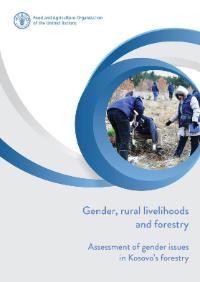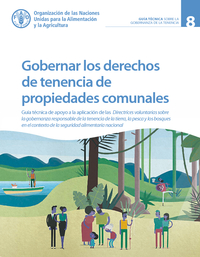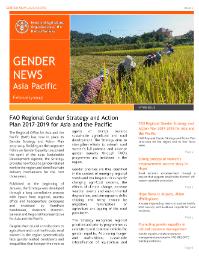Focal point
Location
The Food and Agriculture Organization of the United Nations leads international efforts to defeat hunger. Serving both developed and developing countries, FAO acts as a neutral forum where all nations meet as equals to negotiate agreements and debate policy. FAO is also a source of knowledge and information. We help developing countries and countries in transition modernize and improve agriculture, forestry and fisheries practices and ensure good nutrition for all. Since our founding in 1945, we have focused special attention on developing rural areas, home to 70 percent of the world's poor and hungry people.
Members:
Resources
Displaying 671 - 675 of 5073Gender, rural livelihoods and forestry
The main purposes of this research are to identify and analyse the role of women and men in the forestry sector in Kosovo, and women’s and men’s ownership and use of forests. The report also aims to analyse the gender issues within the institutional policy and legal framework that governs forest management, in order to provide recommendations on how to mainstream gender in forest policies in Kosovo more effectively.
Gobernar los derechos de tenencia de propiedades comunales
Millones de personas de todo el mundo dependen de recursos naturales, como la tierra, la pesca y los bosques, que se utilizan de manera colectiva como propiedades comunales. Estas son fundamentales para la cultura, el bienestar y la identidad cultural. Como fuente de alimentos e ingresos, constituyen una importante red de seguridad, en particular para las personas más vulnerables y marginadas.
Gender Newsletter Asia Pacific September 2017
This issue contains stories on country level activities and news and updates on events, publications and trainings relater to the gender work in FAO in Asia and the Pacific. There is a report on FAO's contribution to the Sustainable Development Goal Five (SDG5) and a feature article on Isan Indigenous Thai Silk Yarn production.
Gender Newsletter Asia Pacific February 2017
The Regional Office for Asia and the Pacific (RAP) has now in place its Gender Strategy and Action Plan 2017-2019. Building on the corporate Policy on Gender Equality (2012) and the spirit of the 2030 Sustainable Development Agenda, the Strategy provides new focus to gender-related work in the region and identifies main delivery mechanisms for the next three years.
Antigua and Barbuda and FAO
The twin-island state of Antigua and Barbuda has been a member of FAO since 1983. Cooperation over the past 30 years has produced a strong partnership, both at the country and Caribbean level. FAO interventions have ranged from food security and agriculture policy formulation to direct support in a variety of areas, including food production, crop protection and fisheries development as well as natural disaster response and preparedness.











